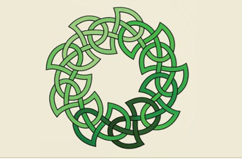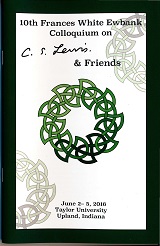Event Title
Paper Session 5-A: New Perspectives
Location
Euler 100
Start Date
4-6-2016 9:15 AM
Description
"C.S. Lewis and Christian Post-modernism: Jewish Laughter Reversed" - Kyoko Yuasa
C. S. Lewis's Till We Have Faces (1956), a tragedy about a queen who fails in her search for self-fulfillment, initially appears to be a no laughing matter. however, Lewis's last novel can be read as a comedy in which Jewish humor is reversed into Christian joy. Although G. K. Chesterton's influence on Lewis's comical expression has been studied at some length, the impact of Joy Davidman and Jewish culture on Lewis's idea of laughter has not yet been explored sufficiently, even though she was deeply involved in the editing of Till We Have Faces. This presentation will compare Lewis's concepts of humor, Jewish and Christian, in his Reflections on the Psalms (1958), evaluate Davidman's imprint on Till We Have Faces, and conclude that Lewis is a writer of Christian Postmodernism, reversing into the completion of the Gospel and retelling mythologies in the style of postmodernist literature.
"A Beast's Best Friend: Interspecies Friendship in the Fiction of C. S. Lewis" - Edwin Woodruff Tait
"The Inklings and Race: Whiteness, Mythology, and Jesus" - Andrew T. Draper
How do Narnia and Middle earth affect our appraisal of the Inklings' views on race? This paper will asses the manner in which the Occidental mythology appropriated by Lewis and Tolkien influenced a subtle yet prevalent hierarchical racialized schema in their mythical narratives. While resisting the blanket post-colonial critique of Western Christian writings as necessarily inherently racist, this paper explores the aesthetic imaginary at work in the Inklings' views of the world to situate them as people of their times and traditions.
Drawing on the theological race theory of Willie James Jennings and J. Kameron Carter, this paper will claim the the supersessionism (the view that the Church has replaced Israel) is at the heart of Western theology's often problematic views on theological anthropology, particularly in relation to the question of race. While demonstrating the ways in which Lewis' and Tolkien's visions often channeled this trajectory, this paper will explore the manner in which modernity has presented Jesus as a "cultural reflex" Christ. It will conclude with a vision of a presented scandalous mutual convergence in the flesh of the Jewish Jesus of Nazareth, a vision for reconciliation that resists the assimilationist structures of whiteness.
Event Type
Paper
Paper Session 5-A: New Perspectives
Euler 100
"C.S. Lewis and Christian Post-modernism: Jewish Laughter Reversed" - Kyoko Yuasa
C. S. Lewis's Till We Have Faces (1956), a tragedy about a queen who fails in her search for self-fulfillment, initially appears to be a no laughing matter. however, Lewis's last novel can be read as a comedy in which Jewish humor is reversed into Christian joy. Although G. K. Chesterton's influence on Lewis's comical expression has been studied at some length, the impact of Joy Davidman and Jewish culture on Lewis's idea of laughter has not yet been explored sufficiently, even though she was deeply involved in the editing of Till We Have Faces. This presentation will compare Lewis's concepts of humor, Jewish and Christian, in his Reflections on the Psalms (1958), evaluate Davidman's imprint on Till We Have Faces, and conclude that Lewis is a writer of Christian Postmodernism, reversing into the completion of the Gospel and retelling mythologies in the style of postmodernist literature.
"A Beast's Best Friend: Interspecies Friendship in the Fiction of C. S. Lewis" - Edwin Woodruff Tait
"The Inklings and Race: Whiteness, Mythology, and Jesus" - Andrew T. Draper
How do Narnia and Middle earth affect our appraisal of the Inklings' views on race? This paper will asses the manner in which the Occidental mythology appropriated by Lewis and Tolkien influenced a subtle yet prevalent hierarchical racialized schema in their mythical narratives. While resisting the blanket post-colonial critique of Western Christian writings as necessarily inherently racist, this paper explores the aesthetic imaginary at work in the Inklings' views of the world to situate them as people of their times and traditions.
Drawing on the theological race theory of Willie James Jennings and J. Kameron Carter, this paper will claim the the supersessionism (the view that the Church has replaced Israel) is at the heart of Western theology's often problematic views on theological anthropology, particularly in relation to the question of race. While demonstrating the ways in which Lewis' and Tolkien's visions often channeled this trajectory, this paper will explore the manner in which modernity has presented Jesus as a "cultural reflex" Christ. It will conclude with a vision of a presented scandalous mutual convergence in the flesh of the Jewish Jesus of Nazareth, a vision for reconciliation that resists the assimilationist structures of whiteness.


